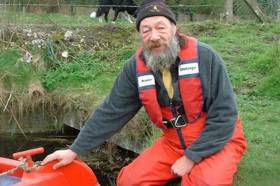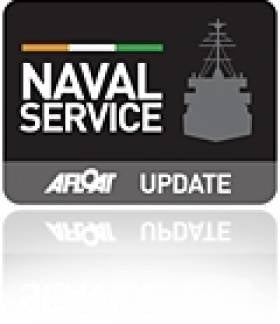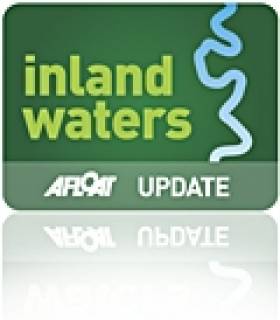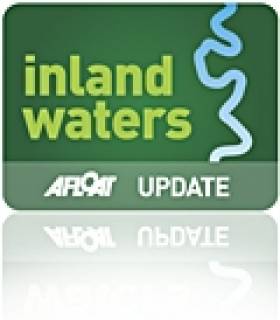Displaying items by tag: Dick Warner
Dick Warner, an Appreciation
On the morning of Friday June 16th 2017, a great man passed way. That man was Dick Warner and he possessed a special kind of greatness. Dick died suddenly while boating near Ballinasloe. While we are all shocked and saddened by Dick's passing, we are safe in the knowledge that when he was called home to port, Dick was engaged in what he himself described as '[his] full-blown love affair with the waterways'.
Dick Warner was always an explorer, a pioneer and an adventurer. Yet for a man who travelled widely from Botswana to Greenland and everywhere in between, Dick considered his 1991 journey along the Grand Canal and River Shannon from Dublin to Limerick aboard canal boat 45M as ‘one of the most profoundly important journeys of my life’.
The purpose of this journey was to once again take a fully laden canal boat from Dublin to Limerick, reminiscing the glory days of the inland waterways transport network, the reason that canals were built in the first place. So why was this journey so significant? And why, when the first series of ‘Waterways’ was broadcast did it have such a lasting impact?
As a child of the sixties, Dick Warner attended school during the same period that CIE ceased commercial boat traffic on the canals. Some years later Dick lived aboard a boat in Hazelhatch near Celbridge on the Grand Canal at a time when this was considered very unusual. Later, Dick settled near Donadea in Kildare, one of the most unspoilt and natural regions in the county. Dick Warner was a prominent member of the Inland Waterways Association of Ireland (IWAI) and through membership he developed a passionate association with the Grand Canal in particular.
This may help to explain why the first series of ‘Waterways’ featured the Grand Canal. It told the tale of Grand Canal Company boat 45M as she travelled for one last time with a cargo of Guinness from Dublin to Limerick. 45M was the only original canal boat that could do this journey and she was also a boat with significant history. 45M sank at Parker Point on Lough Derg in Co Tipperary in 1946 with the loss of 3 of her 4 crew. She was raised, purchased and faithfully restored to her original condition by Donnacha Kennedy in 1975, so her choice for inclusion in the ground-breaking ‘Waterways’ series demonstrated Dick Warner’s commitment to regenerating the heritage of Ireland’s canals while at the same time highlighting their potential for future generations.
By the 1990s Dick was already a well-known environmentalist, writer and broadcaster but the five series of ' Waterways' ensured international recognition for a humble and selfless champion of our canals and rivers. Dick held life membership of IWAI Kildare and he did so much to promote the use, without exploitation, of the Grand Canal in his beloved home county. Dick was a regular and visible supporter of IWAI Kildare events and campaigns including the reopening of the canal harbour in Naas in 2002. Dick Warner did so much to put the potential of Ireland’s inland navigations in sharp focus and he did so in such an understated manner. We have lost a truly great man in Dick Warner, a unique champion who continuously highlighted the beauty and magic of slow tourism on our navigations. He will be sadly missed.
Ar dheis De, go raibh a ainm usail
IWAI
#InlandWaters - Tributes have been paid to veteran naturalist and broadcaster Dick Warner, who died today (Friday 16 June) after taking ill on a boat on the Shannon, as The Irish Times reports.
Warner was best known for his landmark 1990s RTÉ documentary series Waterways, which returned for a six-part special on the Royal Canal in the autumn of 2011.
But the expert on Ireland’s coastal and inland waters, described on social media as “Ireland’s greatest waterman”, is credited with more than 90 TV documentaries in his career — including the Voyage series in 1999.
The Irish Times has more on tributes to Warner here.
It is only in recent years that larger vessels can berth at this stretch of the waterfront following the completion of several major construction projects over the last decade. From the building of the Convention Centre and the Samuel Beckett Bridge which involved using the dredger Hebble Sand (click HERE) during its construction process.
In addition the refurbishment of Spencer Dock sea-lock entrance that for many years was closed is now re-opened. The dock entrance featured in the start of the new television series 'Waterways'-The Royal Canal. Episode two is this Sunday on RTE 1 at 8.30pm.
Aside the 79m L.E. Roisin, the last large vessel to berth close to berth 16A was the French 58m tallship Belem, which was chartered by Alliance Francaise to celebrate their 50th anniversary in 2010 and for the inaugural French Hoist the Sail: Market Festival. The three-masted barque built in 1896 was once also owned by the Sir Arthur Ernest Guinness under the name of Fantôme II.
Situated between where L.E. Roisin is currently berthed and where the Belem had moored, is home to the 'resident' M.V. Cill Airne, a floating bar and restaurant dining venue at berth 16B. Another resident is the former lightship Kittiwake at berth 17B, though sited much further downstream at the end of North Wall Quay, opposite the O2 Arena and next to the East-Link Bridge.
There is a fourth resident, again berthed on the north quays, though the Jeanie Johnston unlike her counterparts is moored closer to the city-centre at Custom House Quay. Apart from yachts, leisure-craft and occasional private motor-yachts using the Dublin City Moorings, she is the only vessel to permanently occupy a berth between Samuel Beckett Bridge and the Sean O'Casey foot-bridge.
- inland waterways
- Dublin Port
- Dublin Docklands
- Royal Canal
- Jeanie Johnston
- naval service
- Custom House Quay
- Alliance Française
- Spencer Dock
- Sean O'Casey Bridge
- River Liffey
- Belem
- Sir John Rogersons Quay
- TallShips
- North Wall Quay
- Fantome II
- Dick Warner
- Dublin City Moorings
- Navy News
- O2 Arena
- EastLink bridge
- LE Roisin
- Sir Arthur Guinness
- National Convention Centre Dublin
- Samual Beckett Bridge
Waterways Returns to the Screen This Sunday
Waterways returns to RTÉ television after 16 years off the air this coming Sunday.
The original award-winning 1990s documentary series saw naturalist and poet Dick Warner undertake an epic journey traversing the canals of Ireland by barge.
This year filmmaker Stephen Rooke accompanied Warner as he returned to our inland waterways, this time to explore the newly restored Royal Canal and celebrate the reopening of the entire route from Dublin to the Shannon.
As previously reported on Afloat.ie, Warner travels on the Rambler, an original canal tug barge, from Dublin to Lough Ree - the first time it had followed the route since 1923.
Along the way, Warner meets both experts and ordinary people who live along the banks, learning from them about its heritage, history and wildlife.
Filming is now complete on the new six-part series, Waterways - A Royal Canal, which begins this Sunday night.
According to Irish Film and Television News, Rooke re-assembled the core team from the original series, many of whom have gone on to work on successful films and TV shows.
The series begins on RTÉ One at 8.30pm on Sunday 2 October.
New Doco Tells Story of Royal Canal
A new documentary on Ireland's waterways is being filmed in Mullingar this week.
The series will follow naturalist and broadcaster Dick Warner as he explores the Royal Canal in time for the final reopening of the entire route.
Warner will be taking the Rambler, an original canal tug barsg, from Dublin through to Lough Ree for the first time since 1923.
Warner told the Westmeath Examiner that he's "enjoying the wildlife side of it the most, the kingfishers and herons, the wildflowers, that's what I've loved the most about this journey. We're making very good progress. We're in Ballymahon now and we hope to reach the Shannon by towards the end of this week."
Waterways - The Final Journey is set to come to our screens in August.
The Westmeath Examiner has more on the story HERE.


































































